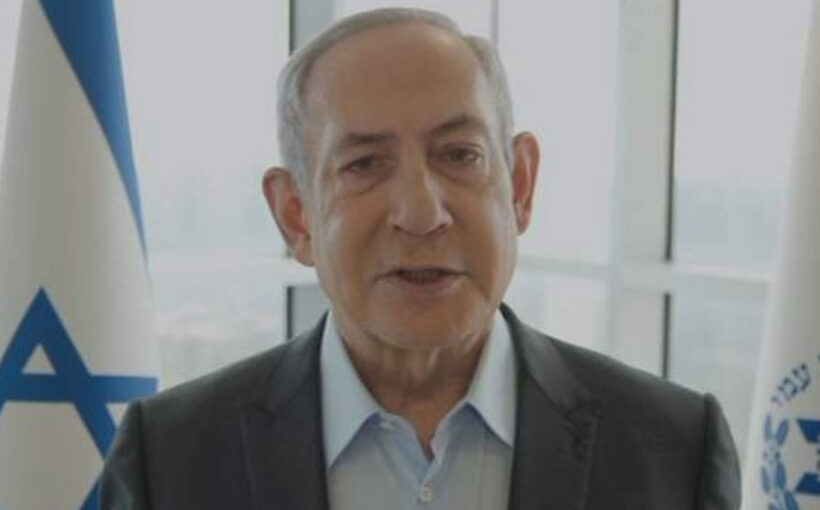NEW YORK — Israeli Prime Minister Benjamin Netanyahu insisted Friday that Israel has “no choice” but to keep fighting Lebanon-based Hezbollah, while neglecting to mention a U.S.-backed 21-day ceasefire proposal in the spiraling battle.
His comments — or lack thereof — to the U.N. General Assembly are likely to undermine the U.S. and French-led effort to pause the fighting, and further frustrate Western officials already annoyed by Netanyahu’s vacillation.
“As long as Hezbollah chooses the path of war, Israel has no choice,” the Israeli leader said. “Israel has every right to remove this threat and return our citizens to their homes safely, and that’s exactly what we’re doing.”
Netanyahu has over the past 48 hours sent mixed messages on the ceasefire proposal, which the U.S. is presenting as a temporary step to lay the groundwork for a more long-lasting truce.
The Israeli leader initially dismissed the idea, saying he “did not even respond” to it and implying he wouldn’t agree to stop the fighting. Spokespersons for the Biden administration countered by saying Israel’s government had privately backed the proposal — one reason, they said, why the U.S. and France unveiled it.
Then, hours before his U.N. speech Friday, the prime minister’s office issued a statement that slightly walked back his earlier denial, saying “Israel shares the aims of the U.S.-led initiative.”
Netanyahu’s helter-skelter approach stems in part from his precarious political position. He’s in power because of a handful of far-right coalition partners who demand tough approaches to Israel’s adversaries. If he crosses those partners, his government could fall and he could lose power, leaving him more vulnerable to corruption charges. At the same time, much of the Israeli public also wants a thorough routing of Hezbollah.
Netanyahu has pulled similar moves before during his country’s ongoing war with Hamas militants in the Gaza strip. He will tell U.S. officials one thing privately while publicly denying or refraining from taking such a stand. For example, when President Joe Biden unveiled a multi-stage peace proposal to end the fighting in Gaza earlier this year, he said it was an Israeli plan; then Netanyahu refused to own it.
The Israeli prime minister faced a tough audience at the United Nations, where many countries have criticized Israel’s actions in Gaza over the severe humanitarian fallout. Throughout this week, an array of world leaders gathered for the U.N. General Assembly’s annual meeting have used their speeches to slam Israel, with some also blaming Hamas. There have been broad calls for stopping the escalating fight in Lebanon.
Dozens of diplomats walked out of the room as Netanyahu began his speech, leaving the General Assembly floor relatively empty. But he brought supporters — families of hostages who cheered and applauded throughout his address.
Their vocal support even prompted UNGA President Philémon Yang to bang his gavel. “Order, please! Ladies and gentlemen, order!”
Netanyahu was defiant against the criticism leveled against Israel at the General Assembly this week, comparing scenes from Oct. 7 to the Holocaust.
“We see this moral confusion when Israel is falsely accused of genocide,” he said. “We will fight until we achieve victory, total victory. There is no substitute for it.”
Netanyahu also aimed his criticisms towards the U.N., describing the institution as an antisemitic “contemptuous farce.”
Hamas militants attacked Israel’s south on Oct. 7, killing 1,200 people and prompting a massive Israeli retaliation that has left tens of thousands dead in Gaza. On Oct. 8, Hezbollah fired rockets into Israel’s north. That led tens of thousands of Israelis to leave their homes in that region.
But the Israeli-Hezbollah faceoff had largely been limited until recent weeks, when Israel decided it could no longer tolerate an effective loss of territorial sovereignty in its north.
As Israel has raised its pressure on Hezbollah — through airstrikes that have killed hundreds, not to mention booby-trapped pager and walkie-talkie attacks that wounded thousands — the U.S. and its allies have tried to keep the conflict from spiraling further.
America’s top worry over the past year has been that the conflicts in Gaza and along Israel’s north could drag in Iran, which backs both Hezbollah and Hamas, becoming a full-on regional war. Such a war could also lead to a more direct U.S. military role if Israel needs help.


